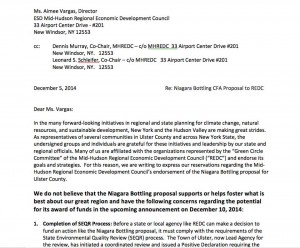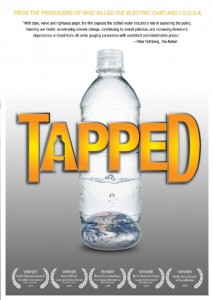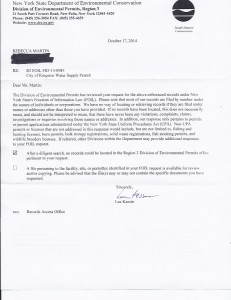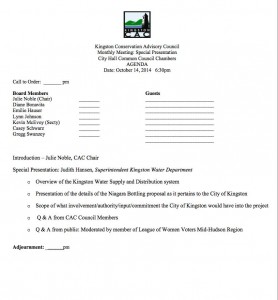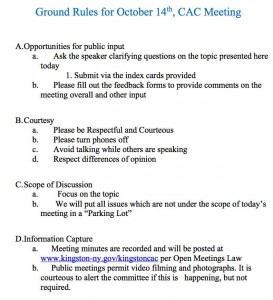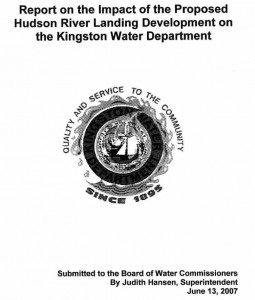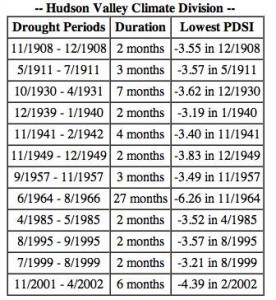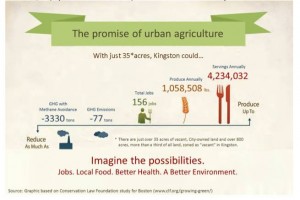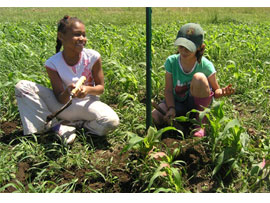“As John Adams said, we are “a government of laws, and not of men.” This is the ethic we hope to preserve through our work at Kingston Citizens, and we resolve – in this New Year – to continue to ask our leaders to be role models of citizenship.” – KingstonCitizens.org
On December 29th, 2014 SUNY Ulster President Donald Katt RESPONDED to the hundreds of letters generated by KingstonCitizens.org from concerned citizens regarding the possible acceptance of the Niagara Bottling Company into the Start-Up NY program.
The long awaited ANNOUNCEMENT from Governor Cuomo was issued on that same day with two of the five proposals submitted to Start-Up NY by SUNY Ulster selected. Neither of them were Niagara Bottling Company. Good work everyone!
However, Start-Up NY is a new program, and we’ve seen multiple announcements made over the last 6 months at participating campuses. Until we hear otherwise, SUNY Ulster’s three other proposed businesses at Ulster (that includes Niagara) could be ON THE TABLE AT A LATER DATE.
We are committed to seeing this through to the very end with you.
Please READ KingstonCitizens.org’s Policy and Planning Advisor Jennifer Schwartz Berky’s response to President Donald Katt below.
Happy New Year to you all.
– Rebecca Martin
Thank you for your LETTER dated December 29, 2014 in response to Kingston Citizens regarding Start-Up New York. We are dedicated to promoting transparency in government through civic engagement and public education. While we are interested in understanding the decisions that led to your support of the Niagara Bottling Company for Start-Up New York at SUNY Ulster, our focus is broader. For the past decade, we have engaged the community and our leaders in meaningful dialogue about governance and community development. We believe that the public has the right and the obligation to understand how decisions are made in the public interest.
In your letter, you suggest that Ulster County citizens and groups are engaged in a ‘robust debate’ regarding the Niagara Bottling Company proposal. However, so much of the information about the proposal has not been made available to the public. While we recognize the importance of confidentiality in certain aspects of business, the basis for decisions in the public interest must be clear. The public cannot engage in an open, fact-based debate where the decision-making criteria and process are not transparent.
As John Adams said, we are “a government of laws, and not of men.” This is the ethic we hope to preserve through our work at Kingston Citizens, and we resolve – in this New Year – to continue to ask our leaders to be role models of citizenship. It is in this spirit that we invite you to meet with representatives of the SUNY Ulster Environmental Club and Kingston Citizens in the next two weeks to share information regarding the Niagara Bottling Company proposal and to engage in – as you called it – “an important and welcome part of that discussion.”
In what follows, I respond to the points in your letter (showing your text in bold italics) with the hope that we can continue a fact-based dialogue in our proposed meeting:
Thank you for copying me on the email you sent to the Commissioner of Economic Development and the Chancellor of the State University of New York. New York has a history of robust debate when it comes to environmental and economic development issues and input from concerned citizens and groups is an important and welcome part of that discussion. […] Reviewing the process and the credentials that were considered in the case of Niagara Bottling, I cannot imagine an outcome other than that which we reached given the defined role that the College performs.
We welcome “robust debate.” Your letter states that you cannot imagine another outcome than the one reached by the College. However, debate and discussion are dependent upon a shared review of all available information. We would like to learn more about the scientific, economic and educational aspects of your decision making process. The Start-Up New York regulations require the college to describe, in its application, how the proposed businesses would generate positive community and economic benefits, including:
diversification of the local economy,
environmental sustainability, and
opportunities as a magnet for economic and social growth.
These required criteria are not discussed in the proposal. We are concerned about how or whether the Niagara Bottling plant can meet these and the other criteria of the Start Up New York program.
I want to clarify the role of SUNY Ulster within the context of the Start-Up NY program with which we, along with many other components of SUNY have chosen to become actively engaged. The steps defined by the SUNY Chancellor’s office are clear and concise and include filing a plan for participation, which we did, being one of the first few in the state to receive approval.
As a part of that defined process, we named a committee to meet with and review proposed projects to determine if the prospective company was eligible to complete a proposal to be forwarded to New York’s Empire State Development Corporation (ESD) for consideration. At that point, if recommended, the campus president forwards the project to ESD.
Given the great need for economic development in our area and the importance of environmental sustainability – a responsibility we all bear, but which should be of particular importance to an educational institution that sets an example for its students and community – we ask that you share more information about the decision making process that led to the approval of Niagara Bottling Company’s application to participate in Start Up New York. The environmental ramifications, local, regional and beyond, are important in any enterprise. As such, opening questions for our dialogue with you and the Start-Up New York committee would include:
What was the analysis that led to your decision to support the Niagara Bottling plant project?
Was there a cost/benefit analysis as part of your evaluation? What were the results?
What were the environmental considerations reviewed by the committee?
As for the jobs and links to the educational mission of SUNY Ulster, what were the criteria used to determine whether these would provide meaningful educational opportunities for the students and link to SUNY Ulster’s mission?
In addition, did the committee evaluate the proposed wages in connection with the living wage standards in Ulster County?
What other proposals received by SUNY Ulster (you mention that about 20 businesses applied) and how were they evaluated? Is this evaluation ongoing?
We understand that the Start-Up New York application review process requires the college to provide certification of its notification of and any written responses to the proposal by the municipality or municipalities surrounding the proposed off-campus site, as well as responses by the college faculty senate, union representatives and the campus student government. We appreciate the college’s esteemed tradition in the environmental management field and your awareness of this issue. Therefore, since the source of water from Kingston’s reservoir is in Woodstock, we question why these two municipalities were not participants in the notification process and why this documentation was omitted from the 39 PAGE AMENDED PLAN DATED AUGUST 29th, 2014 FROM SUNY ULSTER.
It is now up to other agencies with different clearly defined processes to analyze and make determinations about the viability and value of the project. Being an educator and one with a strong belief in informed decision-making based upon factual information, I look forward to the process unfolding. However, I am not a party to, nor a decision maker within those systems.
As the leader of SUNY Ulster, you are the key participant in this process. Although the final decisions are made in Albany, the Start-Up New York Regulations make you “a party to,” and “a decision maker” for our community. In addition, the PROGRAM REGULATIONS and STATUTE do not exclude SUNY Ulster Board of Trustees from the process. Given the size, complexity, and potentially regional impacts of the Niagara Bottling plant proposal, the planning process that you oversaw is nothing less than a critical step in the decision making process. If the SUNY Ulster President’s Office has been entrusted with the responsibility of recommending a project with so many implications for our community, we believe that you have an equal responsibility to help the public understand how and why you assessed the whole of this Niagara project as worthy of funding. Furthermore, as the SUNY Ulster Trustees have a fiduciary responsibility to the college, we believe that their role, even if voluntary according to Start-Up New York’s guidelines, is crucial in the decision making process. They are important leaders in Ulster County with deep ties in our community.
We have had about 20 inquiries, from a variety of companies. Companies seek us out, we do not recruit companies. To this date we have submitted three applications to ESD for final approval into StartUp. All three are manufacturing-related. I support Start-Up NY, because it is a new program that looks to address the need for jobs in upstate NY. I also support it, because it allows unique learning experiences for students with participating partners. It is my hope that residents of Ulster County understand that I pursued the Niagara/StartUp only for the benefit of our students and the improvement of our local economy.
We do not see economic development and environmental protection as an “either/or” scenario. We believe that there are better alternatives to the Niagara Bottling plant proposal. In our presentation to the SUNY Trustees, we outlined reasons for concern on both fronts. In 2007, Ulster County adopted a sustainable economic development plan, “Ulster Tomorrow,” that identified core competencies that would generate innovative clusters to build our economy. The plan was completed and approved with the help of a renowned economic consultant and input from scores of leaders in every sector in our county, including Trustees and members of the SUNY Ulster community. Although we do not have the details of the two companies that have been approved for Start-Up New York at SUNY Ulster, their business models appear to be more in keeping with the concepts of sustainable development. As you noted, there were about 20 inquiries for the program. We are interested in their proposals and the potential they offer for innovation and clusters that may truly lead to job growth in our area.
A water bottling plant is not a sustainable business. So far, 90 colleges in the United States have officially banned bottled water and your students are now proposing that you make a similar commitment to sustainability in college management and curriculum. Also, as we noted in our presentation, this particular industry does not align with the well-accepted principles of clustering and sustainable development adopted in the County and the Mid-Hudson Regional Economic Development Council’s (MHREDC) plans. It is an economically isolated activity that will rely on plastics manufacturing, an industry widely acknowledged to generate major pollutants in its extraction, production, and disposal processes. The use of a publically-financed infrastructure and our municipal water supply, a natural resource with finite possibilities, to support further economic development and growth in our area is inconsistent with the goals set forth in “Ulster Tomorrow,” the MHREDC plans, and the Regional “Cleaner, Greener” Sustainability Plan supported by Governor Cuomo. Finally, this proposal is inconsistent with the “Public Trust Doctrine,” which maintains that water and other natural resources belong to the public and it is the government’s obligation to preserve them for public use.
As participants in Ulster County’s diverse, educated workforce, the constituents of Kingston Citizens support SUNY Ulster and its mission: “SUNY Ulster is a vibrant community of learners distinguished by academic excellence, collaboration, innovation, service, and responsible use of resources.” We respect SUNY Ulster’s tradition of excellence in environmental and economic fields of endeavor. Your mission, including “responsible use of resources,” must be aligned with regional goals that have been defined, collaboratively, with other thought leaders who are likewise committed to define, preserve and develop our assets. Our regional assets are intertwined: our valuable natural resources have a shared and equal impact upon our quality of life as humans and on our potential for future economic development. The goals of benefitting SUNY Ulster students and improving our local economy must live in harmony with our region, its valuable natural and human resources, and its economic future.
We therefore ask you to have an open and productive dialogue with us, the college community, and our leaders in economic development and environmental resource management. Given the potentially imminent decisions regarding Start Up New York, we request you meet with us as soon as possible.
Respectfully,
Jennifer Schwartz Berky
Planning & Policy Advisor
KingstonCitizens.org



